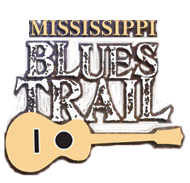Marcus Bottom
Marcus Bottom - Vicksburg
The historic African American community of Marcus Bottom was an important center of early blues, jazz, and gospel music activity. Pianist Eurreal “Little Brother” Montgomery, one of the premier blues artists of the 1920s and ‘30s,performed here and in other areas of Vicksburg. His song “Vicksburg Blues” became a blues standard and has been recorded by many other performers. Famed blues composer Willie Dixon, a Vicksburg native, was particularly inspired by Montgomery’s music.
Vicksburg was uniquely positioned to play an important role in blues and jazz history. A lively river port midway between New Orleans and Memphis, Vicksburg was not only the most populous city in Mississippi in the late 1800s and early 1900s, but also home to the state’s largest African American community. A wide range of musical traditions mingled here as professional traveling bands, itinerant guitarists from Delta cotton plantations, barrelhouse piano players, and others worked the clubs and cafes in Marcus Bottom and in areas of town closer to the river.Vicksburg was at one time a base for Delta blues pioneer Charley Patton, fellow guitarists Bo Carter and Honeyboy Edwards, and a plethora of pianists led by Little Brother Montgomery, along with many noted early musicians who were born here, including Willie Dixon, Milt Hinton, Johnny Young, Walter Barnes, and Thomas Pinkston.
In the 1920s Little Brother Montgomery (c. 1906-1985) performed at the South Side Park Dance Hall, just east of Halls Ferry Road on Lane Street, as well as at Zach Lewis’s and Bell’s Café, both on Washington Street. Montgomery’s music left a strong impression on the young Willie Dixon, and when Dixon became a powerful figure on the Chicago blues scene decades later, he hired Montgomery for recording sessions and club dates. Among the pianists Montgomery recalled playing in Vicksburg were Earnest “44” Johnson, also known as “Flunky,” Sam “Cracking Kid” Johnson, Tommy Jackson, Walter Lewis, and a pair who were skilled musicians despite their impairments: Nub-Fingered Son Cook and Stiff Arm Eddie Scott.
Jazz legends Earl “Fatha” Hines, King Oliver, Bennie Moten, and Louis Armstrong also played at the South Side Park Dance Hall, according to music historian Earnest McBride, who lived near the club. While the Blue Room and the Cotton Club elsewhere in town later booked the big name acts, the musical tradition continued in Marcus Bottom with local performers (including Willie Johnson, Billy Jones, and Leon Dixon) or blues on the jukeboxes at the Playboy Club, the El Morocco, Delia’s Do Drop Inn, the Open House, Big Will’s, the Red Dot Inn, and the Melody Lounge. Various members of Vicksburg’s popular Red Tops band, including trumpeter Willard Tyler, grew up nearby. In 1954 folklorist Frederic Ramsey, Jr., came to Marcus Bottom in search of traditional African American music and recorded string band musicians Tom Johnson and John Copeland for a Folkways Records series called Music of the South. Former resident C. K. Chiplin chronicled the local community before and during the civil rights era in his 1996 book Roads From the Bottom: A Survival Journal for America’s Black Community.
content © Mississippi Blues Commission
[ BACK TO TOP ]

